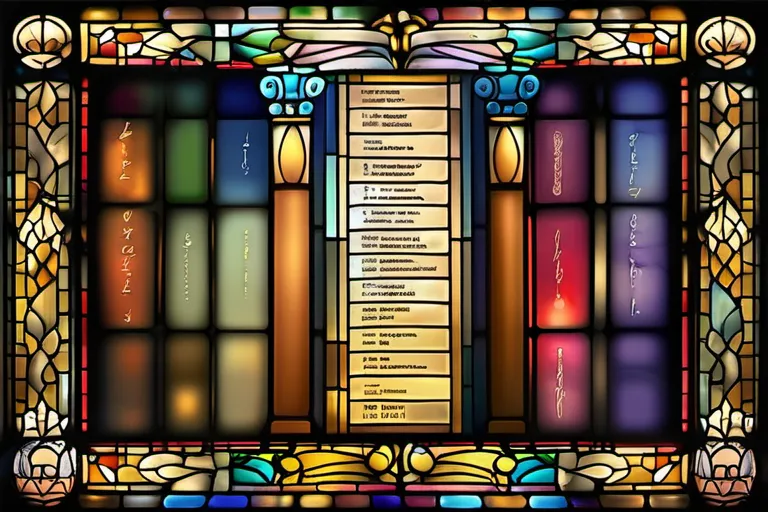Exploring the Distinctive Features of the Decalogue in Christian Belief
The Ten Commandments hold a significant place in both Judaism and Christianity. However, they are unique within Christianity due to their role as moral guidelines and spiritual principles. This article delves into the distinctive aspects of the Ten Commandments in Christian belief.
The Historical Context
The Ten Commandments, inscribed on stone by God’s own hand, have echoed through time like a profound symphony in the history of religion. But what makes them unique within Christianity? To answer this, we must first delve into their historical context.
In the biblical narrative, the Decalogue is revealed during a pivotal moment at Mount Sinai, where Moses receives these divine laws from God himself. This event, steeped in divine authority, sets them apart as not just rules but as commandments, carrying the weight of spiritual and moral guidance.
In Judaism, the Ten Commandments serve as a cornerstone of religious practice, outlining the relationship between God and His people. But how do they manifest their unique significance in Christianity?
One might wonder if the Christian interpretation simply reiterates Jewish law or if there are new insights brought to the table. The answer lies in the Nicene Creed, which proclaims that Jesus is fully God and fully man, thus elevating these commandments into a framework for living out one’s faith in Christ.
Consider how the Christian understanding of love, as seen in the Great Commandment to ‘love the Lord your God with all your heart and with all your soul and with all your mind’ (Matthew 22:37), intertwines with the Ten Commandments. This love extends beyond just following rules to a deep devotion that transforms one’s relationship with both God and neighbor.
The Ten Commandments in Christianity are not just commandments; they are gateways to understanding Christ’s teachings, offering a blueprint for ethical living rooted in grace and mercy. By exploring their unique significance within Christian belief, we gain insight into the rich tapestry of divine guidance that shapes our faith journey.
The Role of the Ten Commandments in Christian Morality
How do you navigate through life’s moral complexities? The Ten Commandments offer Christians a clear roadmap, acting like lighthouses guiding them towards ethical behavior and wise decision-making. Imagine these commandments as a sturdy ship’s mast, holding up the sails that catch the winds of virtue and righteousness. Each commandment is not just a set of rules but a framework for building a life centered on love, respect, and justice.
Consider the first commandment: “You shall have no other gods before me.” It’s more than just avoiding idols; it’s about recognizing God as the supreme authority in your life. This commandment invites Christians to seek a deeper relationship with their Creator, ensuring that every decision is made under His guidance, much like aligning a compass needle towards magnetic north.
The second commandment, “You shall not make for yourself an idol,” speaks to the heart of humility. It challenges believers to avoid placing undue trust or value in things that can’t give eternal satisfaction, such as material possessions or human opinions. This is akin to recognizing the vastness and complexity of the universe and understanding our place within it.
These commandments function not just externally but also internally, shaping the very character of a Christian. They act like a soul’s compass, pointing towards virtues like integrity and compassion. For instance, “You shall not steal” isn’t just about property; it encompasses honesty in all its forms—word, deed, and thought. By adhering to these commandments, Christians are essentially building a moral fortress that resists the winds of temptation and wrong.
Moreover, the Ten Commandments serve as a mirror, reflecting our shortcomings back at us. They reveal the depths of sin within each of us, but also provide hope through their grace-based covenant with God. In this sense, they’re not just rules to be followed; they’re invitations to deeper transformation and spiritual growth.
In summary, the Ten Commandments are more than historical relics or mere guidelines—they are living, breathing principles that shape Christian morality, ethical behavior, and decision-making. They serve as a timeless reminder of God’s love and His expectations for us in this world.
The Spiritual Significance of the Ten Commandments
The Ten Commandments, like a lighthouse guiding ships through treacherous waters, offer Christians a beacon of spiritual guidance in their daily lives. But what makes these commandments truly unique within Christian belief? Are they just a set of rules or do they carry deeper, more profound meanings?
One might ask, are the Ten Commandments merely a legalistic framework, or do they embody spiritual principles that resonate with our innermost desires for righteousness and holiness? Consider them as not just a list, but a series of steps leading us closer to God. Each commandment is like a door, inviting us into a sacred space where we can encounter the divine presence.
Take the first commandment: ‘You shall have no other gods before me.’ It’s more than just avoiding idolatry; it challenges us to place God at the center of our lives. How often do we allow distractions or self-interest to overshadow our relationship with God? This commandment calls us to prioritize Him, making Him the first priority in every decision and action.
The second commandment, ‘You shall not make for yourself a carved image,’ speaks directly to our hearts. It’s about more than just avoiding idols; it’s about recognizing that God is beyond anything we could create with our hands or minds. This commandment reminds us of the transcendence and uniqueness of God, something no human artwork can capture.
The Ten Commandments also offer a framework for loving others as ourselves (commandments 13-19). These are not separate from loving God; they are intrinsically linked. By caring for our neighbors, we demonstrate the love that God has shown us. This is perhaps the most profound aspect of these commandments – they unite personal piety with social ethics, making them a holistic approach to Christian living.
In essence, the Ten Commandments in Christianity go beyond mere rules. They are a dynamic invitation to live lives filled with love, justice, and faith. By exploring their spiritual significance, we uncover the rich tapestry of Christian belief and practice, woven together by threads of God’s will and wisdom.
So, as you meditate on these commandments, ask yourself: How do they guide your journey? What doors are they opening for deeper engagement with God? The Ten Commandments offer not just a path but a way of life that invites us to become the best versions of ourselves in His image.
The Ten Commandments and the Covenant with God
The Ten Commandments stand as a cornerstone of Christian belief, but what makes them unique within this faith? Could it be that they represent more than just moral guidance—they symbolize a profound covenant between God and humanity?
Imagine the Ten Commandments as a lighthouse in a stormy sea. For Christians, these commandments serve as beacons guiding them through life’s tumultuous waters. But why are they so distinctive in Christian theology? Could it be that their unique placement within the broader narrative of the Old Testament helps shape our understanding of God’s covenant?
Consider the context: The Ten Commandments were given to Moses on Mount Sinai, marking a special agreement between God and His chosen people. This covenant was not just about rules; it was about trust and relationship. In Christianity, these commandments take on additional layers of meaning. They represent a divine blueprint for living in harmony with God’s will.
But how do Christians view the Ten Commandments? Are they seen as a legalistic burden or as a path to spiritual freedom? Some might argue that viewing them through a Christian lens transforms their nature. Instead of being merely prohibitions, they become opportunities for growth and transformation. They point us towards a life lived in accordance with God’s loving will.
Is it not fascinating how these ancient commands continue to resonate in the modern world? They offer timeless advice on how to navigate relationships, maintain integrity, and find peace within ourselves and with our Creator. In this sense, they are not just historical artifacts but living guides that can shape our daily lives.
So, when we look at the Ten Commandments through a Christian perspective, we see them as more than just laws—they are expressions of God’s love and His desire for our salvation. They serve as reminders of the covenant we share with Him, calling us to live in obedience and faithfulness.
Interpretations of the Ten Commandments in Christianity
Imagine the Ten Commandments as a lighthouse, guiding ships through treacherous waters towards safe harbor. Throughout Christian history, these commandments have served as beacons, illuminating the path to righteousness and moral clarity. But what makes them unique in Christianity? To explore this question, we must delve into various interpretations that have shaped Christian teachings over centuries.
One interpretation sees the Ten Commandments as a foundational document of ethical living, emphasizing love for God and neighbor above all else. Could it be that these commandments are not just a set of rules but a living testament to agape, the selfless love that Christ exemplified? This view suggests that adhering to the Ten Commandments is an expression of faith, a way of life, rather than mere compliance.
In another perspective, the commandments are seen as a framework for personal and communal responsibility. They challenge believers to reflect on their actions and intentions, encouraging introspection and spiritual growth. Could these commandments act like a mirror, reflecting our true selves and revealing areas where we fall short of God’s expectations? This approach highlights the transformative power of the Ten Commandments in fostering moral integrity and accountability.
Christian theologians throughout history have offered diverse interpretations, each adding depth to the understanding of these timeless principles. Some see them as a reflection of Nature Law, inherent truths that transcend cultural boundaries. Others view them through the lens of sola scriptura, emphasizing their direct relevance from sacred texts. These varied perspectives enrich Christian belief by providing multiple lenses through which to understand and apply the commandments in daily life.
But let us not forget, as these interpretations evolve, so too do the contexts within which they are applied. The Ten Commandments have faced criticism for being outdated or culturally specific. Yet, their enduring relevance lies in their adaptability—being both timeless and timely, a testament to their deep significance in Christian tradition.
The Legacy of the Ten Commandments in Modern Christianity
The legacy of the Ten Commandments in modern Christianity is like a guiding light, illuminating the moral path for believers. But how do these ancient laws continue to shape our lives today? Is there more than just a historical significance to them? Could it be that their relevance lies not only in their content but also in the way they challenge us to live virtuous lives?
Imagine the Ten Commandments as a sturdy lighthouse, its beam cutting through the fog of modern society. Each commandment serves as a beacon, reminding Christians of the virtues that define their faith. For instance, ‘Honor thy father and mother’ isn’t just about respecting one’s parents; it’s a call to respect authority, loyalty, and love in all relationships. And ‘You shall not covet’, while addressing material desires, speaks to our inner selves, urging us to avoid envy and jealousy.
The Ten Commandments are like a map for navigating the complex terrain of modern life. They guide Christians through moral dilemmas, helping them make decisions that align with their faith. In an age where technology and social media can blur ethical lines, these commandments provide clarity, offering timeless wisdom on how to live ethically.
Moreover, the Ten Commandments are not just a set of rules but a framework for understanding God’s character. They reveal His expectations, showing us that He desires our hearts as much as our actions. In this way, they challenge us to seek deeper spirituality and a closer relationship with Him.
But how do these ancient commands hold up in the face of modern challenges? Can they still offer practical advice for dealing with issues like social justice, environmental stewardship, or technological advancements? The answer lies in their enduring relevance. By adapting their principles to new contexts, Christians find that these commandments remain a valuable resource for navigating contemporary issues.
So, as we continue to explore the Ten Commandments in modern Christianity, we must ask ourselves: How can we bring these ancient teachings into our daily lives? In what ways do they shape our values and influence our decisions? The answers lie within us, guiding us towards a life of faith, integrity, and love.
Conclusion
 Understanding the Ten Commandments’ unique role in Christianity can provide valuable insights into the moral and spiritual foundations of this faith. By appreciating their significance, we can better understand the values that underpin Christian teachings.
Understanding the Ten Commandments’ unique role in Christianity can provide valuable insights into the moral and spiritual foundations of this faith. By appreciating their significance, we can better understand the values that underpin Christian teachings.











